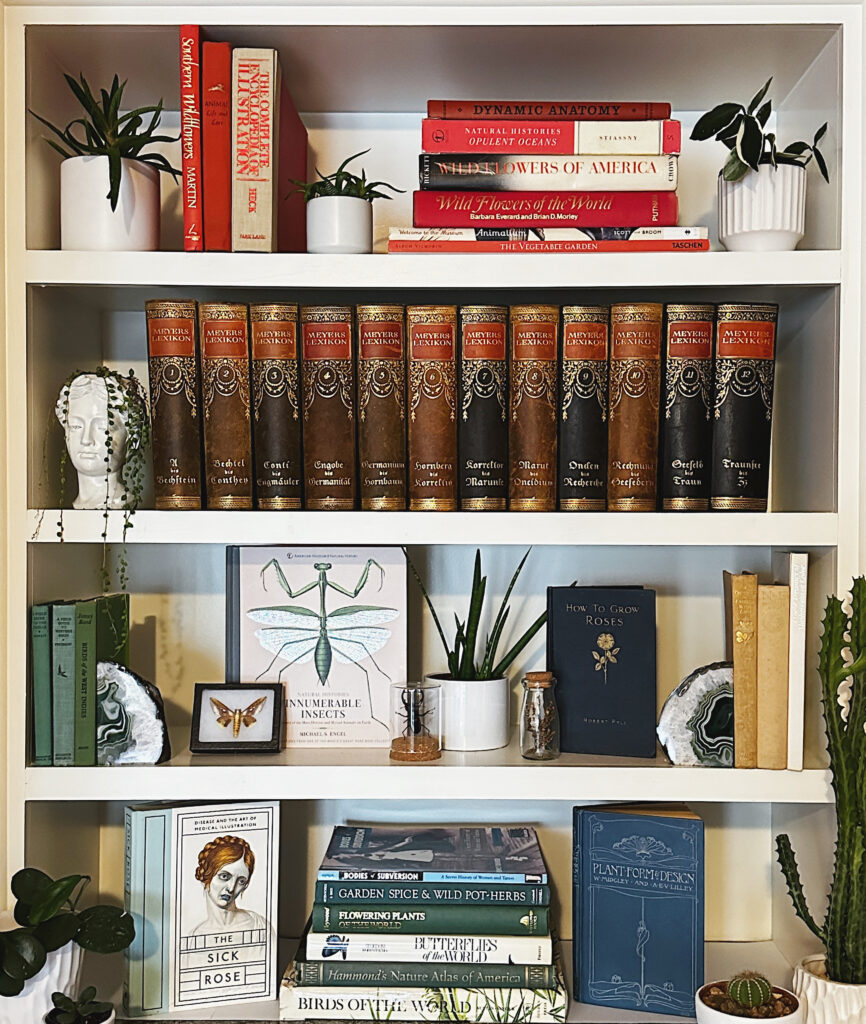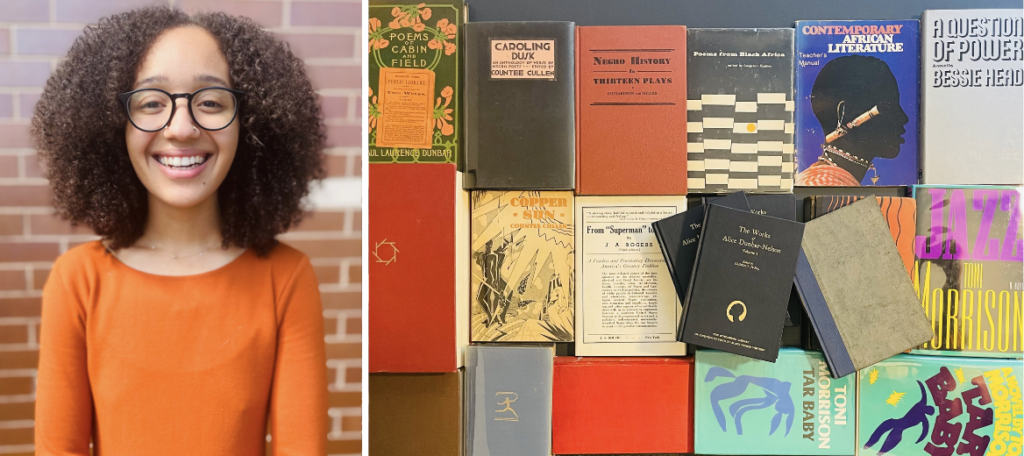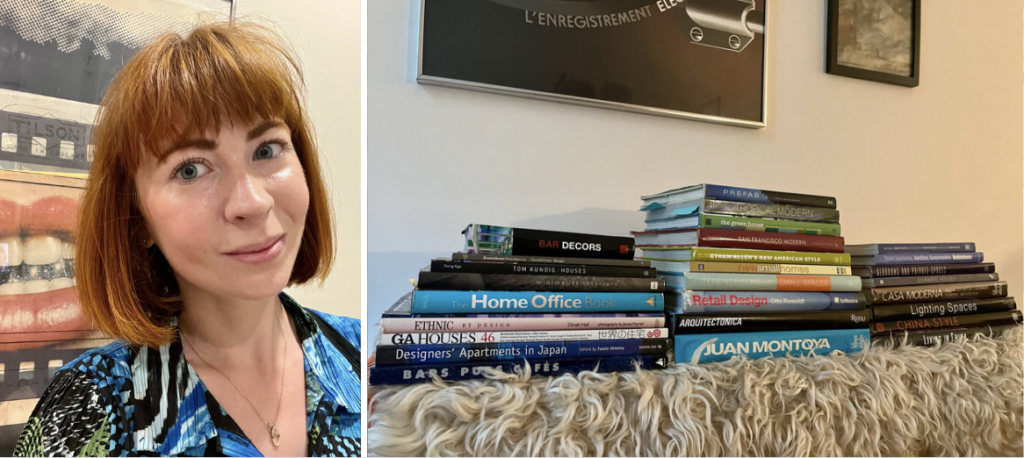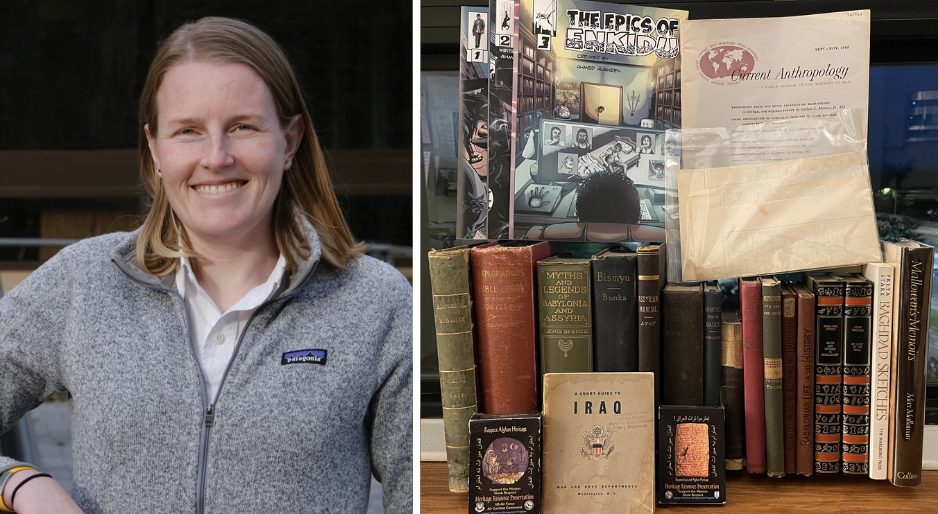In 2017, Honey & Wax Booksellers established an annual prize for American women book collectors, aged 30 years and younger. Our goal, at the time, was to expand the popular perception of who book collectors are (and can be) by highlighting original collections built by young women, often without the knowledge or help of the rare book trade. By celebrating their achievements, we hoped to inspire potential collectors to look at their shelves differently, to identify patterns and projects, to think creatively about the aspects of the historical record they might recognize and preserve.
The response to this prize over the past seven years has exceeded all of our expectations. We are inspired by our contestants, and delighted to announce the $1000 winner of the 2023 Honey & Wax Book Collecting Prize.
WINNER
Auroura Morgan, 30, (she/they), owner of Black Lantern Tattoo Co. in Nashville, Tennessee, for “Hybrid Botanicals: A Modern Tattoo Artist’s Reference Collection.”
As a creator of custom tattoo designs, Morgan collects books depicting the anatomy of the natural world —flowers, fruits, trees, fungi, birds, fish, insects, mammals, seashells, rocks—with a particular emphasis on botanical illustration:

“When I am with clients in my studio, the first portion of our session is idea development and research. Botanicals are the most popular subject material in my work as an artist…. I focus on making my art as anatomically correct as possible. I mostly reference high-resolution photos from the internet or photos that either party has captured. Then, I stylize them with art techniques found within my collection of botanical illustrations. The goal is to produce a new, specialized piece of art, translated from the art of botanical illustration. In the design of the tattoo structure comes a flow with the canvas, the human body, for decades to come.”
We were impressed by the cross-pollination between Morgan’s book collection, the clients she serves, and the art she creates. Her collection is more than a standard reference library, providing templates to copy. It is a living collection, inspiring new design approaches in response to her clients’ ideas and needs. A continually generative resource, the collection reflects Morgan’s interests and inspires her to transform them in the studio, tattoo by tattoo, into a body of original botanical art.
You can read Morgan’s winning essay and bibliography here.
We are also awarding five honorable mentions of $250 each:
HONORABLE MENTIONS

Cate Barton, 21, (she/her), from Tyngsboro, Massachusetts, a student in the dual BA program between Sciences Po Paris and Columbia University, for “Film on the Page: Creative Intersections of Cinema and Books.”
Barton’s collection began with a collection of still photographs from Alfonso Cuarón’s 2018 film Roma, a book that mixed two of her favorite media, film and print, in a surprising way. Rather than focusing on books written about film, Barton pursues books that try to capture some moving part of film on paper: storyboards, production stills, screenplays.
“The common thread amongst my collection is the ability to take one whole work of art, such as a film, and break it down using the mechanism of the book. In this way, the book truly feels like a tool, not only for education but for appreciation and understanding, and also depiction of art itself…. These books have really opened up pathways of thinking about films which I had never expected.”
We enjoyed the sense of discovery in Barton’s collection, as she brought a sharp eye to each new acquisition, considering how each book communicates an aspect of an entirely different medium. Her emphasis on the materiality of her books, as objects, was refreshing.

Kierra Duncan, 24, (she/her), from Los Angeles, California, a doctoral candidate in English at Princeton University, for “Origin Stories: Anthologies and Bibliographies in Afro-Diasporic Literature.”
Duncan’s essay takes us on a journey, from her experience as a reader captivated by the heft and feel of a printed book, to a student seeking “a literary approach to Afro-American history,” to a committed collector of anthologies and bibliographies devoted to Black writers, not only in the United States, but across the anglophone Caribbean and Britain.
“The archivist inside me met the bibliophile…. Why did the anthological and bibliographical form proliferate in the late nineteenth and early twentieth centuries? What do the curatorial choices made by editors tell us about how Black literature, and its perceived use-value, was being preserved, imagined, and debated?”
We admired the way that Duncan’s pursuit of scarce and out-of-print editions and titles makes her, through the act of collecting, an anthologist and bibliographer in her own right, “documenting and preserving Black authorship” on both sides of the Atlantic.

Abbey Elder, 30, (she/they), from Ames, Iowa, the Open Access Librarian for Iowa State University, for “A Collection of Works by and concerning Roger Zelazny.”
Elder’s collection of books by and about her childhood favorite Roger Zelazny, author of the bestselling fantasy series The Chronicles of Amber, shows how a nostalgic impulse can lead to rewarding new paths of inquiry:
“As I started obtaining multiple copies of the same books in different editions—at this point, I have eight copies of The Dream Master in various forms—I recognized that what I was growing was a collection, not just a personal library. It was this understanding that led me to be more interested in what books existed for me to collect…. I am particularly interested in expanding my scope to find those books that have Roger’s fingerprints on them, so to speak.”
We were swept up in the completist energy of Elder’s project, and cheered when she acquired Zelazny’s own copies of the college literary magazines in which his earliest poems appeared. Her final pivot to those writers who were influenced by Zelazny offers a promising field for further exploration.

Madeline Lafuse, 30, (she/her), from Columbia, Maryland, a doctoral candidate in history at the CUNY Graduate Center, and teacher at Brooklyn’s Berkeley Carroll School, for “Interior Design and Internet Age Globalization, 1995-2005.”
Lafuse collects interior design books published in the early days of the internet age, as architects and designers first imagined homes and offices with computers at their center, spaces designed for “laptops as big as briefcases.” Her collection reflects a collective dream of an international future, in which the citizens of the world are united by technology and modern design.
“Mine are hopeful books where designs cross national borders and harmonize peoples in the process. . . . Between 1995 and 2005, designers, architects, authors, editors, and the normal people who patronized their works sought to realize a globalized modern world through intentional interior design. How did they embrace the potential of the digital in the spaces of their daily life with joy and beauty? And how might we, as we move from the age of the internet to the age of artificial intelligence, do the same?”
We loved the originality of Lafuse’s collection: published just before widespread digitization, her out-of-print, out-of-fashion guides are in many cases the best record of these optimistic, futuristic interior designs.

Sara Mohr, 30, (she/her), from Utica, New York, the Digital Scholarship Librarian at Hamilton College, for “Lux ex Oriente: The Many Histories of the Ancient Near East.”
Mohr’s collection of American and European books about Iraq began as a research library for her degree in Assyriology, but soon developed into a more critical collection of histories of the region produced by Western soldiers, archaeologists, explorers, and tourists. Observing that “the Middle East is often defined for those of us overseas by its visitors over its residents,” Mohr asks:
“What kinds of visitors has Iraq seen over the years? How have their viewpoints shaped how we talk about the region now? In the interest of answering these questions, I started acquiring items like travel writing, military resources, and memoirs and reflections on their time in the Middle East from scholars to fiction writers.”
As Mohr’s collecting took her “beyond the academic sphere,” we especially appreciated her attention to historical ephemera, from a pocket guide to Iraq distributed to American naval personnel during World War II, to decks of Heritage Resource Preservation playing cards issued by the United States Department of Defense to service members in Iraq and Afghanistan after the 2003 invasion.
To see last year’s winners, click here.
The co-founders of the Honey & Wax Prize, Heather O’Donnell of Honey & Wax Booksellers and Rebecca Romney of Type Punch Matrix, would like to thank the 2023 prize sponsors: Biblio, Bibliopolis, The Caxton Club, Swann Galleries, and Ellen A. Michelson.
The post Honey & Wax Book Collecting Prize 2023 Winners appeared first on The Millions.









